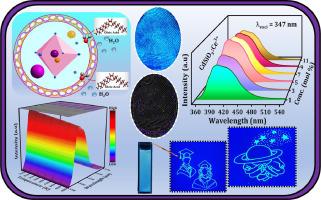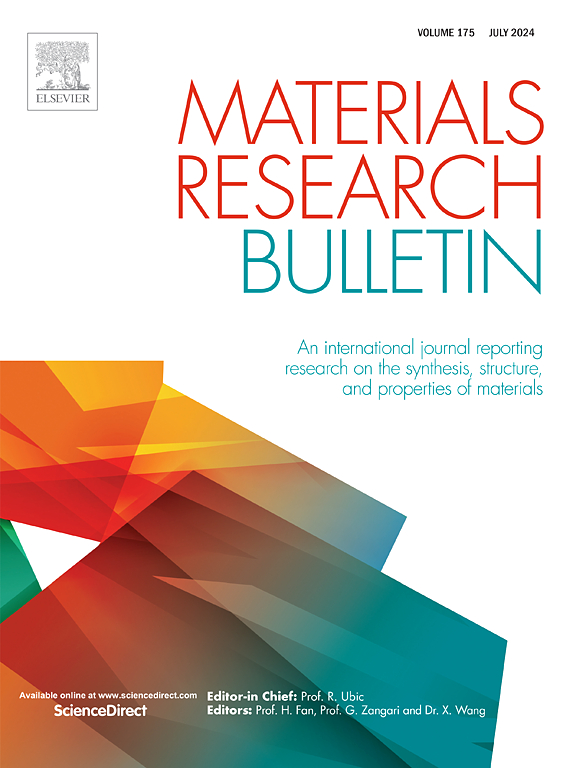油酸改性 CdSiO3 的前沿应用:Ce3+ 荧光粉:人工智能增强潜伏指纹检测、防伪和光学测温
IF 5.3
3区 材料科学
Q2 MATERIALS SCIENCE, MULTIDISCIPLINARY
引用次数: 0
摘要
通过溶液燃烧法合成了一系列 (1-11 mol%) 掺杂 Ce³⁺ 的 CdSiO₃ 荧光粉,并用油酸 (OA) 对最佳掺杂浓度的样品进行了表面改性。X 射线衍射(XRD)分析证实了高纯度、结晶良好的 CdSiO3:Ce3+ 荧光粉的形成。在 347 nm 紫外线激发下,荧光粉在 400 nm 处发出强烈的蓝色光,优化的 Ce³⁺ 浓度为 5 mol%,这归因于偶极-偶极相互作用。OA 改性荧光粉的性能显著增强,色纯度 (CP) 达到 97.2%,内部量子效率 (IQE) 达到 82.5%。该荧光粉还表现出卓越的热稳定性,在 423 K 和超过 483 K 的热淬火温度下仍能保持 93.0% 的发射强度,活化能(Eₐ)高达 0.384 eV。在实际应用中,OA 修饰荧光粉在不同基底的潜伏指纹(LFP)检测和防伪(AC)方面表现出卓越的性能,具有高分辨率、高对比度和最小背景干扰。基于 MATLAB 的分析得出了 94.52% 的匹配分数,超过了传统的基准,凸显了荧光粉在高级指纹识别方面的潜力。这些结果表明,CdSiO₃:5Ce³⁺荧光粉有望应用于白光发光二极管(w-LED)、光学温度测量、法医分析和交流技术。本文章由计算机程序翻译,如有差异,请以英文原文为准。

Cutting-edge applications of oleic acid-modified CdSiO3: Ce3+ phosphors: Artificial intelligence enhanced latent fingerprint detection, anti-counterfeiting and optical thermometry
A series of (1–11 mol%) Ce³⁺ doped CdSiO₃ phosphors are synthesized via a solution combustion method, and the sample with the optimal doping concentration underwent surface modification with oleic acid (OA). X-ray diffraction (XRD) analysis confirmed the formation of high-purity, well-crystallized CdSiO3:Ce3+ phosphors. Upon 347 nm UV excitation, the phosphor exhibited intense blue emission at 400 nm, with an optimized Ce³⁺ concentration of 5 mol%, attributed to dipole-dipole interactions. The OA-modified phosphor demonstrated significantly enhanced properties, achieving a color purity (CP) of 97.2% and Internal quantum efficiency (IQE) of 82.5%. The phosphor also exhibited excellent thermal stability, retaining 93.0% of its emission intensity at 423 K and a thermal quenching temperature exceeding 483 K, with a high activation energy (Eₐ) of 0.384 eV. In practical applications, the OA modified phosphor showed exceptional performance in latent fingerprints (LFPs) detection and anti-counterfeiting (AC) across different substrates, offering high resolution, contrast, and minimal background interference. MATLAB based analysis yielded a matching score of 94.52%, surpassing conventional benchmarks, underscoring the phosphor's potential for advanced fingerprint identification. These results demonstrate that the CdSiO₃:5Ce³⁺ phosphor is a promising candidate for applications in white light-emitting diodes (w-LEDs), optical thermometry, forensic analysis and AC technologies.
求助全文
通过发布文献求助,成功后即可免费获取论文全文。
去求助
来源期刊

Materials Research Bulletin
工程技术-材料科学:综合
CiteScore
9.80
自引率
5.60%
发文量
372
审稿时长
42 days
期刊介绍:
Materials Research Bulletin is an international journal reporting high-impact research on processing-structure-property relationships in functional materials and nanomaterials with interesting electronic, magnetic, optical, thermal, mechanical or catalytic properties. Papers purely on thermodynamics or theoretical calculations (e.g., density functional theory) do not fall within the scope of the journal unless they also demonstrate a clear link to physical properties. Topics covered include functional materials (e.g., dielectrics, pyroelectrics, piezoelectrics, ferroelectrics, relaxors, thermoelectrics, etc.); electrochemistry and solid-state ionics (e.g., photovoltaics, batteries, sensors, and fuel cells); nanomaterials, graphene, and nanocomposites; luminescence and photocatalysis; crystal-structure and defect-structure analysis; novel electronics; non-crystalline solids; flexible electronics; protein-material interactions; and polymeric ion-exchange membranes.
 求助内容:
求助内容: 应助结果提醒方式:
应助结果提醒方式:


